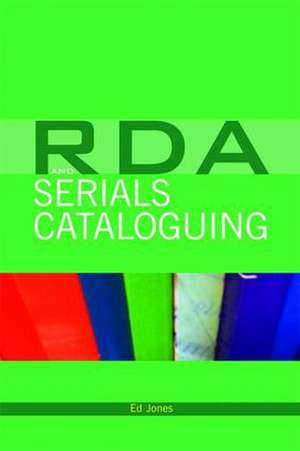RDA and Serials Cataloguing
Autor Ed Jonesen Limba Engleză Paperback – 23 iul 2013
Serials and continuing resources present a variety of unique challenges in bibliographic management, from special issues and unnumbered supplements to recording the changes that a long-running periodical can experience over time. Easing cataloguers through the RDA: Resource Description and Access transition by showing the continuity with past practice, serials cataloguing expert Jones frames the practice within the structure of the FRBR and FRAD conceptual models on which RDA is based.
With serials 146; special considerations in mind, this essential guide explains the familiarities and differences between AACR2 and RDA and demonstrates how serials cataloguers 146; work fits in the cooperative context of OCLC, CONSER and NACO. Jones looks in detail at the process of cataloguing serials and ongoing integrating resources using RDA, from attributes and relationships between works to identifying related entities. Finally, looking at the possibilities offered by Linked Data, he presents examples of how RDA records can ultimately engage with the Semantic Web.
Key topics covered:
160;Introduction to serials and serials cataloguing
Getting to know RDA: changes from AACR2
Searching and the universe of serials
Cataloguing serials and ongoing integrating resources using RDA
General instructions relating to serials cataloguing using RDA and MARC 21
Attributes of resources (Manifestations and Items and the Works and Expressions they embody)
Relationships between resources
Identifying Works and Expressions
Identifying related entities
Online serials and CONSER provider-neutral records
Ongoing integrating resources
RDA and Linked Data.
Readership: Occasional serials cataloguers and specialists alike. Serials and continuing resources present a variety of unique challenges in bibliographic management, from special issues and unnumbered supplements to recording the changes that a long-running periodical can experience over time. Easing cataloguers through the RDA: Resource Description and Access transition by showing the continuity with past practice, serials cataloguing expert Jones frames the practice within the structure of the FRBR and FRAD conceptual models on which RDA is based. With serials’ special considerations in mind, he: explains the familiarities and differences between AACR2 and RDA; demonstrates how serials cataloguers’ work fits in the cooperative context of OCLC, CONSER and NACO; presents examples of how RDA records can ultimately engage with the Semantic Web. Occasional serials cataloguers and specialists alike will find useful advice here as they explore the structure of the new cataloguing framework.
| Toate formatele și edițiile | Preț | Express |
|---|---|---|
| Paperback (2) | 407.86 lei 22-34 zile | |
| Facet Publishing – 23 iul 2013 | 407.86 lei 22-34 zile | |
| Facet Publishing – 14 oct 2024 | 425.93 lei 3-5 săpt. | +21.91 lei 6-12 zile |
Preț: 407.86 lei
Preț vechi: 592.35 lei
-31% Nou
78.04€ • 81.71$ • 64.73£
Carte disponibilă
Livrare economică 21 martie-02 aprilie
Specificații
ISBN-10: 1856049507
Pagini: 236
Dimensiuni: 210 x 280 x 13 mm
Greutate: 0.55 kg
Ediția:1
Editura: Facet Publishing
Colecția Facet Publishing
Public țintă
Professional Practice & DevelopmentCuprins
Descriere
Serials and continuing resources present a variety of unique challenges in bibliographic management, from special issues and unnumbered supplements to recording the changes that a long-running periodical can experience over time. Easing cataloguers through the RDA: Resource Description and Access transition by showing the continuity with past practice, serials cataloguing expert Jones frames the practice within the structure of the FRBR and FRAD conceptual models on which RDA is based. With serials' special considerations in mind, he: explains the familiarities and differences between AACR2 and RDA; demonstrates how serials cataloguers' work fits in the cooperative context of OCLC, CONSER and NACO; presents examples of how RDA records can ultimately engage with the Semantic Web.
Occasional serials cataloguers and specialists alike will find useful advice here as they explore the structure of the new cataloguing framework.
